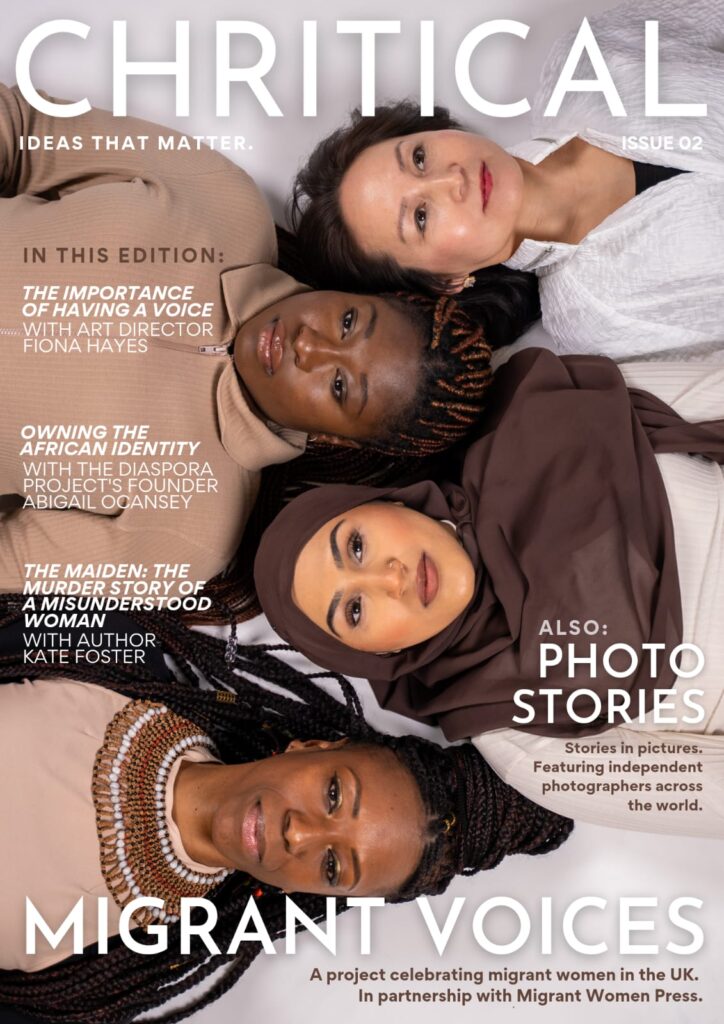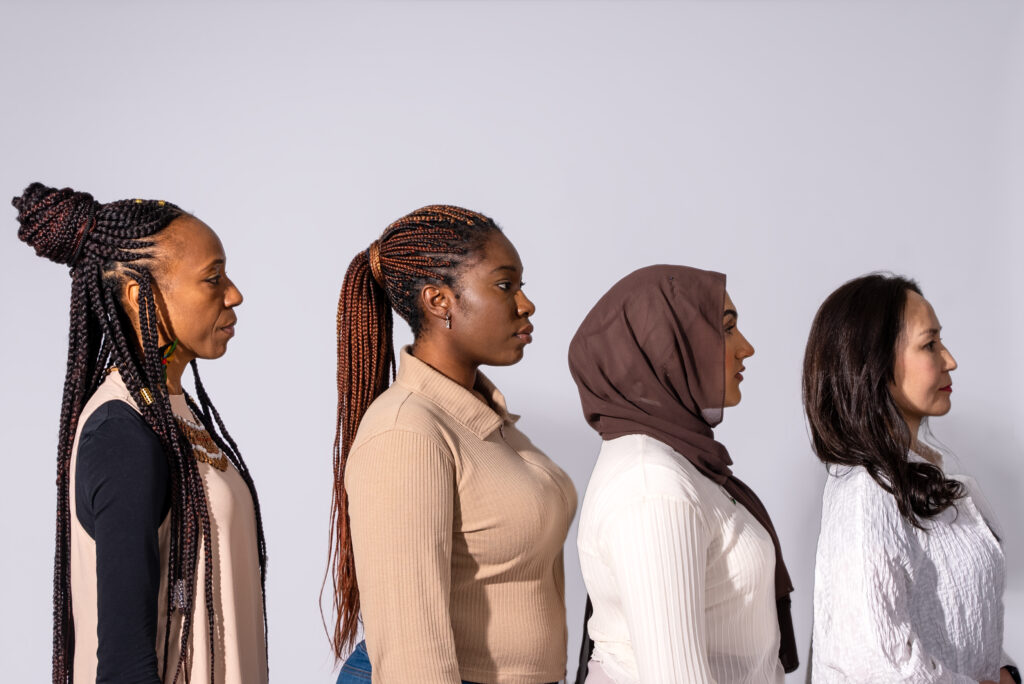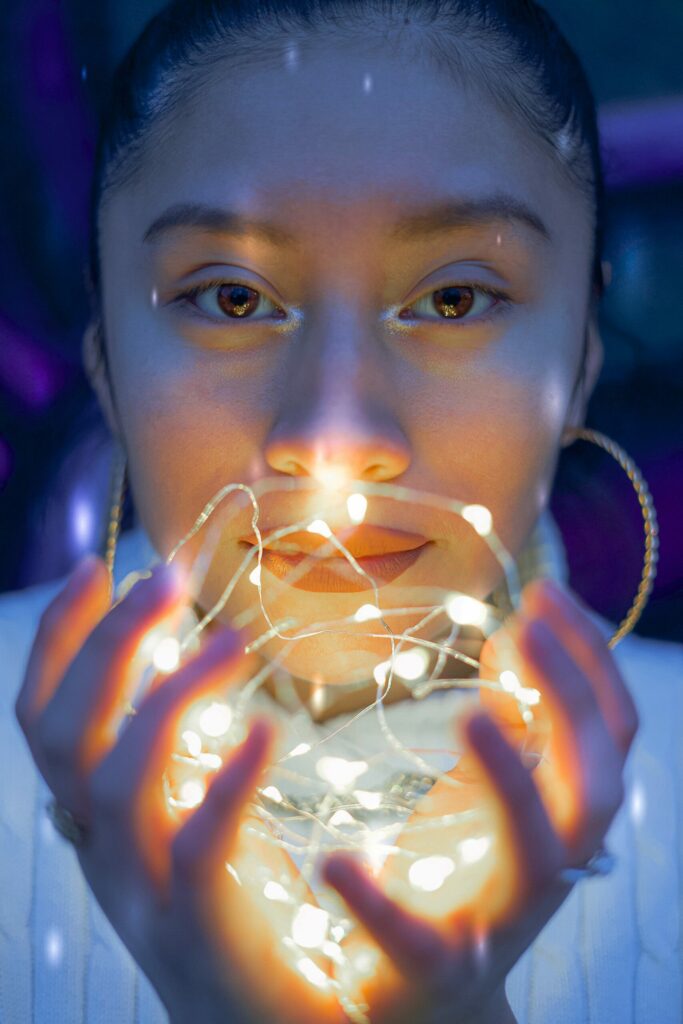Uplifting the migrant woman’s experience beyond stereotypes and negative perceptions of race and migration. A project in collaboration with The Chritical.
Photo Credit: Maxwell Frimpong & Toni Akintude

Digital copies are available to purchase. The next window of pre-orders for print copies will open on June 1st. via The Chritical online store: https://thechriticalmagazine.bigcartel.com/
Migrant Women Press and The Chritical collaborated on a unique project, celebrating migrant women’s beauty and strength and dissociating their images from negative stereotypes and assumptions. Along with beautiful photographs, four women from different migration backgrounds living in Scotland tell their stories and views on ethnicity and migration.

From left to right: Juliana da Penha, Emmanuela Sampong, Zainab Ashraf and UUganaa Ramsay. Photo Credit: Maxwell Frimpong & Toni Akintude
Every migrant has a different story to tell.
Emmanuela Sampong is an Afro-German from Hannover and her parents are from Ghana. She lives in Glasgow.

Personally, I think some misunderstandings people have about migrants are the challenges they face to adapt to new surroundings and cultures. More so, most people think that all migrants face the same struggles and experiences which is absolutely not the case. Every migrant has a different story to tell. Having said that, there are numerous reasons why people move to a different country. A typical example is being a ‘black’ person. There is the perception of black people being under-educated or poor. This is a myth as recent research by the UK government has proven that there has been a percentage increase of graduates with a first-class or 2:1 degree from 50.8% to 67.1% in the black ethnic group. I believe that it’s about time people start to embrace migrants and see the positive impact they make in the host country.
I think of violent movements like ‘Paki-bashing’, and I wonder if younger generations (including myself) truly appreciate how hard this process of integration was.
Zainab Ashraf was born in Glasgow and her parents are from Pakistan.

I was recently part of a conversation where someone spoke of the terms ‘first/second/third generation immigrants’, wondering just how much people have to assimilate before they can be considered British. It’s an interesting
question, one that has stayed with me, and for which I can’t quite decide an answer.
However, I do think this terminology helps us to identify and honour the assimilation and adjustments so many have made to settle here, and to improve the conditions for their children and those still to come. I think of violent movements like ‘Paki-bashing’, and I wonder if younger generations (including myself) truly appreciate how hard this process of integration was. I think people misunderstand just how difficult it still is, because although the threat of physical violence may have decreased, the negative discussions, particularly by politicians, still perpetuate a very hostile environment. This must be especially horrific for those who have had difficult journeys here.
Migrants contribute tremendously: economically, socially, culturally, and in everyday life, not only in Scotland but in the UK and around the world.
Uuganaa Ramsay is from Mongolia and lives in Troon.

I feel sometimes some people don’t know the difference between someone who was born in the UK and grew up here and knows the culture, and someone who came here whether through life choices like work, or different reasons and has to learn not only the language but also the culture. Some stories can give people different messages and negative understanding about how citizens from so-called developing countries come here to take people’s jobs and make things difficult for people living here. It is also used by politicians to win votes to get to the next stage of their political career or to change people’s opinions to get what they need. But migrants contribute tremendously: economically, socially, culturally, and in everyday life, not only in Scotland but in the UK and around the world.
We don’t know anything about individual experiences; there is a lack of humanity in the coverage.
Juliana da Penha is from Brazil and lives in Scotland.

There are many misunderstandings, many of which are caused by the politicians using migrant communities as scapegoating to distract people, so they are unaware of the fundamental problems and the politicians’ failures to sort them out. Another issue is how generally the media portray migrant communities, mainly from a security, border control and catastrophic perspective, based on politicised and toxic discourses. We don’t know anything about individual experiences; there is a lack of humanity in the coverage. These negative portrayals are creating barriers and dividing communities. We don’t feel connected as fellows. We think we are enemies. People are manipulated to believe in stereotypes, in a narrative that increases bigotry and misinformation. This creates more walls and borders and makes us forget our humanity and solidarity.
The Chritical Issue 02 has varied content about different topics around culture, arts&film, sociopolitical and opinion, sparkling on 109 pages with photo stories, interviews and more. You can read the complete Migrant Voices Q&As and a curated list of books by migrant women which is part of this project. The first batch of orders is sold out, and the next window of pre-orders will open on June 1st. Digital copies are always available to purchase via their online store: https://thechriticalmagazine.bigcartel.com/


